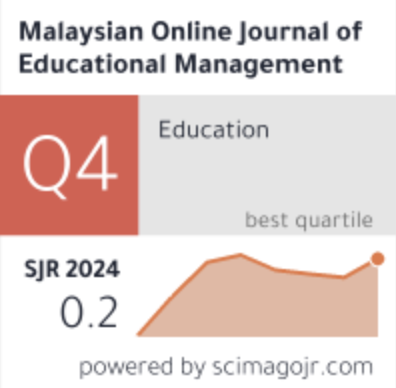DISTRIBUTED LEADERSHIP, CONTEXTUAL FACTOR AND TEACHERS’ SELF-EFFICACY IN MALAYSIA
Abstract
The study investigates the relationship of distributed leadership with teachers’ self-efficacy and the role of contextual factor as mediator in Residential Schools (RS) and National Secondary Schools (NSS) in Malaysia. A total of 831 teachers from 17 schools participated in the study. The findings show a moderately high, positive correlation and significant relationship (r = .50) between distributed leadership with teachers’ self-efficacy. The findings show that teachers’ self-efficacy is slightly higher in Residential Schools (mean = 4.35) compared to National Secondary Schools (mean = 4.33) although this difference was not significant. A large and significant difference, however, is found in distributed leadership between Residential School (mean = 4.20) and National Secondary School (mean = 3.94). The Structural Equation Modelling analysis of the research model shows the coefficient of determination value or R2 is 0.36. The statistic indicates that distributed leadership variable and contextual factors explained 36% of the variance in teacher self-efficacy. The remaining 64% may be attributed to other influences outside the scope of this study. The theoretical implications and recommendations for enhancing distributed leadership and teacher self-efficacy in Malaysian secondary schools are discussed.









